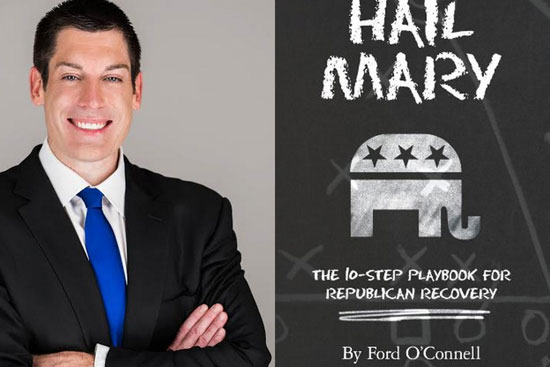One author’s take on how the GOP can turn things around.
By Sarah Valerio
If New York is the city that never sleeps, Washington is the city that never stops talking politics. With another set of elections that carries with it enormous consequences every couple years, there is actually a good reason for this perpetual dialogue.
The way Republican strategist Ford O’Connell sees it, this time for serious self reflection and need for straight talk can’t begin soon enough for the GOP, which he says either needs to accept a few hard truths and make some adjustments, or risk being wiped off the national electoral map and shut out of the White House for the foreseeable future.
In his new book, “Hail Mary: The 10-Step Playbook For Republican Recovery,” O’Connell serves up several bitter pills for Republicans to swallow including “Ronald Reagan is Dead. Accept it.,” “Roe v. Wade is Here to Stay,” “Hug the Gays,” and “Kill Immigration Reform, Kill the GOP,” for starters.
O’Connell, not afraid to tackle controversial issues from abortion to gay marriage and immigration reform in his new book, says he recognizes that some of the more conservative members of the base will balk at some of his suggestions, but that he still took the initiative to write the book after, “Watching the Republican party fall flat on its face in consecutive election cycles,” he says. “It doesn’t take a rocket scientist to figure out some changes have to be made.”
O’Connell doesn’t ask the GOP to change its positions on issues, but rather to adjust delivery and messaging. Among the methods the book suggests are toning down the “fire and brimstone rhetoric” to avoid isolating single-issue voters and going outside the echo chamber by reaching out and appearing on a broader base of media, including entertainment shows rather than just sticking to Fox News.
The reason this will work, according to O’Connell in the biggest takeaway from the book, is because “Most people don’t know a heck of a lot about politics or elections.” O’Connell believes his book can help his party capitalize on this.
While the solutions he lays out are simple concepts at their core, he recognizes they are not that easy to implement, and says change isn’t going to happen overnight in the GOP or in the way the electorate sees the party.
He says that the biggest hurdle Republicans will face in following his playbook is “trying to keep the base energized while winning over moderate and independent voters. It will be hard to shift from the primary to the general election. GOP candidates will need to oscillate their rhetoric enough to keep the base with them while getting beyond the base. It can be done, but it requires precision and message discipline. Any gaffe can override any policy position.”
At risk for Republicans, according to O’Connell, is that “You can lose your way, or you can win period. If you’re loud and lose, you still lose. And you can’t govern if you can’t win elections.
”
To back his conclusions, O’Connell’s book cites shifting demographic trends and election results that paint an increasingly grim picture for a political party that he says has not “articulated a 21st-century agenda” and as a result, finds itself on the short end of the stick with burgeoning segments of the population including minorities, particularly Hispanics, unmarried women and voters under 40.
While O’Connell’s book is heavy in substance, his delivery is witty and funny, which keeps the material entertaining and easy to read.
The book is heavy on facts and stats without getting bogged down with them, resulting in a digestible, in-depth analysis that can be understood and appreciated by those inside and outside of the beltway. He uses football and former President anecdotes throughout to serve as amusing and relevant illustrations to his points.
The book is also intellectually honest and straight-forward, making for a great read regardless of a reader’s political affiliation.
So will Republicans follow the plays outlined in O’Connell’s book in time for 2016?
“I don’t know,” admits O’Connell, adding, “There are some who are starting to think that way. Chris Christie gets it. The answers aren’t in the past.
You’ve gotta look at the future.”

